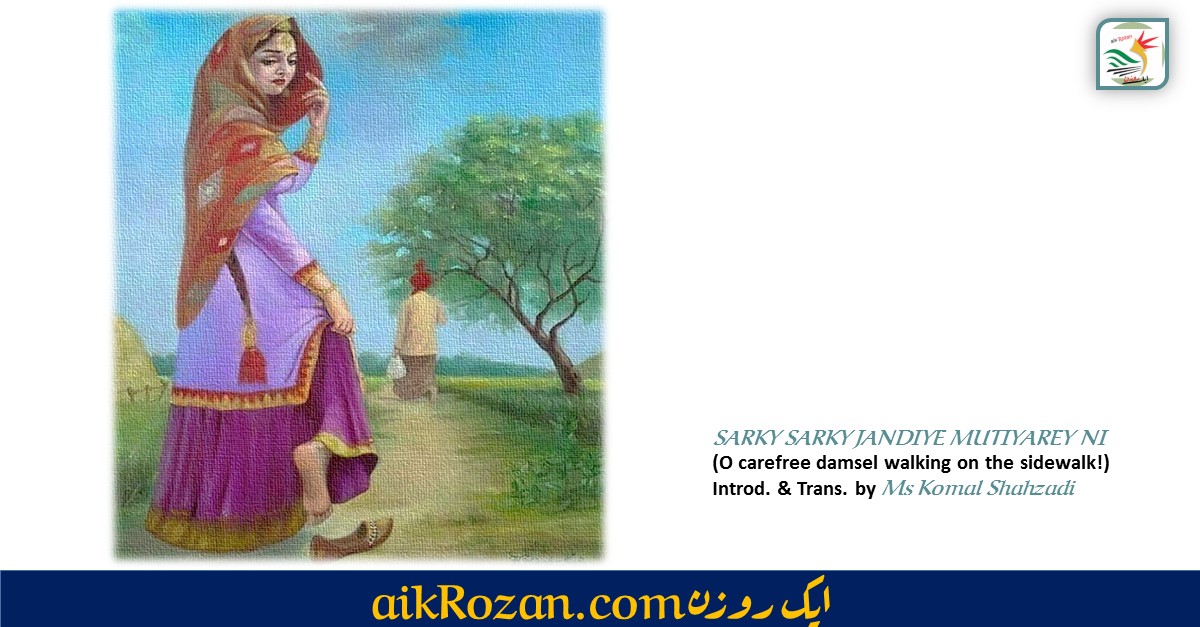
SARKY SARKY JANDIYE MUTIYAREY NI (O carefree damsel walking on the sidewalk!)
Introduced and translated by Komal Shahzadi
“Sarky sarky jandiye mutiyarey ni”, is a popular/folk ballad delightedly sung at wedding ceremonies in Punjabi households all over the world (be it in the Subcontinent, or in the diaspora). Popular ballad, by definition, is “a song, transmitted orally, which tells a story”. And the narrative of this song revolves around a damsel in a village who meets unknowingly her childhood spouse at the sidewalk (now a uniformed man on furlough). Since he had left her at a very tender age to join the army, she doesn’t recognise him. All his offers to help her or requests to seek some favour are denied by the girl for an excuse that he is a stranger. Towards the end her mother-in-law discloses the true identity of his son who is girl’s husband.
Thus, the metrical story with twisting plot of misplaced identity, packed with alliterative repetitions and refrains, progressing mainly through action and dialogue, is fun to sing. I have seen women of three generations (of my grandmother, mother’s and my own friends and cousins) singing it at festive occasions with equal sense of mirth.
Related: Thandia’n Chha’nwa’n, Mithrey Geet: A Medley of Punjabi Verse Translated by, Ms Komal Shahzadi
This song, however, had lost some of its popularity over the last few years. The reason might be the advent of the modern age in which child marriage is seen with certain disliking. Tarsem Jassar, has re-written three concluding stanzas of this folk ballad (wherein the girl talks about her early marriage) to give it a more modern look.
I have translated his version of the song that might be called a literary ballad now. While translating, I have tried to retain the meaning as well as the singing quality of the song.
Scene I: at the sidewalk
(He observes)
O carefree damsel, walking on the sidewalk,
A thorn pricked your sole, O miss frisky at walk.
Hey, a thorn pricked your sole, O naive at heart!
(He insists)
Who will needle the thorn out, O miss carefree?
Who will bear your pain, O damsel so perky?
Think, who will endure the pain? Don’t be so quirky!
(She replies)
*Bhabo extracts my thorn, O policeman guard,
**Veer endures the pain, you aren’t my consort.
Yes, veer bears the pain; I am not your consort!
Scene II: at the village well
(He requests)
O fair lady, taking water from the well,
Draw a drought to quench my thirst, O village girl.
Come, water the ache of thirst my innocent girl!
(She refuses)
O uniformed man, I cannot give it to thee,
Drink water by yourself, I’m not your lady.
See, do this chore on your own, I’m so chary!
(He retorts)
If I smash your pitcher of clay, O lady,
Your chariness will be cured, O coy lady.
O damsel, I will sweep away this modesty!
Scene III:
(He agonises)
In search of love wilted these eyes love-smitten,
To lover’s fate world seems hostile, O maiden.
Look, no one stands the joy of love, O elegant!
(She responds)
This world is stuffed with spendthrift loves, O stranger,
No one stays till end of days; you aren’t my partner.
O stranger, it’s real hard to find a true lover!
(He proposes)
I’m not that type of fake lover’s, O beauty,
Give your hand in bond of love for eternity.
My lady, true lovers, forever, we will be!
*Bhabo means sister-in-law
**Veer means brother
Ms Komal Shahzadi is a faculty member in the department of English at International Islamic University (IIUI), Islamabad.




